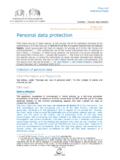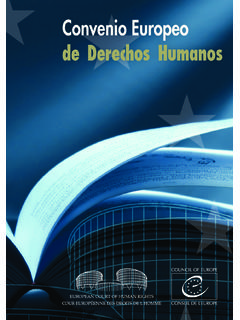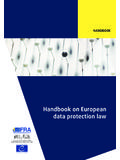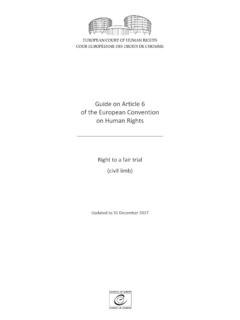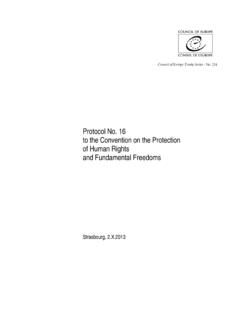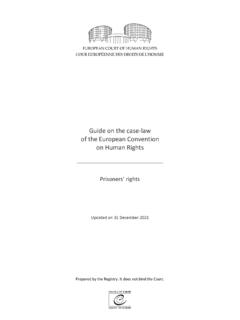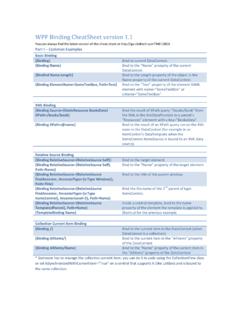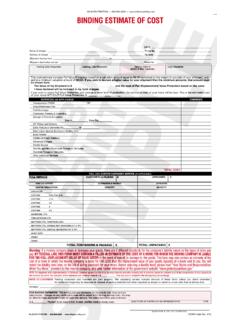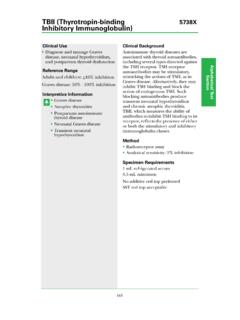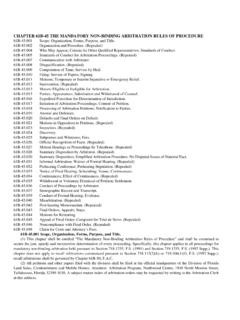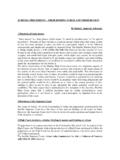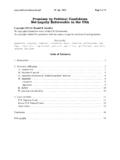Transcription of Questions & Answers - echr.coe.int
1 Questions &AnswersEuropean Courtof Human RightsQuestions & AnswersWhat is the European Court of Human Rights?What is the European Convention on Human Rights?3 These Questions and Answers have been prepared by the Registry of the Court. The document does not bind the Court. It is intended to provide basic general information about the way the Court more detailed information, reference is made to documents issued by the Registry (available on the Court s website: ) and in particular to the Rules of Court. The European Court of Human Rights is an international court based in Strasbourg, France. It consists of a number of judges equal to the number of member States of the Council of Europe that have ratified the Convention for the Protection of Human Rights and Fundamental Freedoms currently 471.
2 The Court s judges sit in their individual capacity and do not represent any State. In dealing with applications, the Court is assisted by a Registry consisting mainly of lawyers from all the member States (who are also known as legal secretaries). They are entirely independent of their country of origin and do not represent either applicants or States. The European Convention on Human Rights is an international treaty which only member States of the Council of Europe may sign. The Convention, which established the Court and lays down how it is to function, contains a list of the rights and guarantees which the States have undertaken to Not all member States have ratified all the Protocols to the Convention (instruments creating additional rights).
3 Information on the subject can be found on our Court of Human Rights Council of Europe F-67075 Strasbourg cedex can I apply to the European Court of Human Rights?What conditions do I have to satisfy to lodge an application?What does the European Court of Human Rights do?45 The Court applies the European Convention on Human Rights. Its task is to ensure that States respect the rights and guarantees set out in the Convention. It does this by examining complaints (known as applications ) lodged by individuals or, sometimes, by States. Where it concludes that a member State has breached one or more of these rights and guarantees, the Court delivers a judgment finding a violation.
4 Judgments are binding: the countries concerned are under an obligation to comply with them. You may lodge an application with the Court if you consider that you have personally and directly been the victim of a violation of the rights and guarantees set out in the Convention or its Protocols. The alleged violation must have been committed by one of the States bound by the rights are protected by the Convention and its Protocols?The following rights, in particular, are protected: "the right to life; "the right to a fair hearing in civil and criminal matters; "the right to respect for private and family life; "freedom of expression; "freedom of thought, conscience and religion; "the right to an effective remedy; "the right to the peaceful enjoyment of possessions; and "the right to vote and to stand for election.
5 What do the Convention and its Protocols prohibit?The following, in particular, are prohibited: "torture and inhuman or degrading treatment or punishment; "arbitrary and unlawful detention; "discrimination in the enjoyment of the rights and freedoms set out in the Convention; "expulsion or denial of entry by a State in respect of its own nationals; "the death penalty; and "the collective expulsion of aliens. What are the conditions relating to me personally? "You do not need to be a national of one of the States bound by the Convention. The violation you are complaining of must simply have been committed by one of those States against a person within its jurisdiction , which usually means on its "You can be a private individual or a legal entity such as a company or association.
6 "You must have directly and personally been the victim of the violation you are alleging. You cannot make a general complaint about a law or a measure, for example because it seems unfair; nor can you complain on behalf of other people (unless they are clearly identified and you are their official representative).Are there any procedures that must be followed beforehand in the national courts? "Yes. You must have used all the remedies in the State concerned that could provide redress for the situation you are complaining about (usually this will mean an application to the appropriate court, followed by an appeal, where applicable, and even a further appeal to a higher court such as the supreme court or constitutional court, if there is one).
7 "It is not enough merely to make use of these remedies. In so doing, you must also have actually raised your complaints (the substance of the Convention violations you are alleging). "You have only six months from the date of the final decision at domestic level (generally speaking, the judgment of the highest court) to lodge an application. After that period your application cannot be accepted by the whom can I lodge an application? "Against one or more of the States bound by the Convention which, in your opinion, has/have (through one or more acts or omissions directly affecting you) violated the European Convention on Human Rights.
8 "The act or omission complained of must be attributed to one or more public authorities in the State(s) concerned (for example, a court or an administrative authority). "The Court cannot deal with complaints against individuals or private institutions, such as commercial can my application be about? "Your application must relate to one of the rights set out in the European Convention on Human Rights. Alleged violations may cover a wide range of issues, such as: torture and ill-treatment of prisoners; lawfulness of detention; shortcomings in civil hearings or criminal trials; discrimination in the exercise of a Convention right; parental rights; respect for private life, family life, the home and correspondence; restrictions on expressing an opinion or on imparting or receiving information; freedom to take part in an assembly or demonstration; expulsion and extradition; confiscation of property; and expropriation.
9 "You cannot complain of a violation of any legal instrument other than the European Convention on Human Rights, such as the Universal Declaration of Human Rights or the Charter of Fundamental should I apply to the Court if I consider myself to be the victim of a violation of the Convention?89By sending a completed and signed application form2 to the Court. The form, together with any relevant accompanying documents, must be sent by post to the following address:The Registrar European Court of Human Rights Council of Europe F-67075 Strasbourg cedex "You may write in one of the Court s official languages (English and French) or in an official language of one of the States that have ratified the Convention.
10 "No purpose is served by sending the application form by fax since this will not interrupt the running of the period laid down in the Convention for applying to the Court. Only the original application form sent by post will be considered by the Court. "Do not come to Strasbourg in person to state your case orally. Your case will not be examined any quicker and you will not receive legal advice. "The Registry may ask you for additional documents, information or explanations relating to your complaints. "You should download the application form from the Court s website, fill it in carefully and legibly, sign it and return it to the Court as 2 The application form can be found on our Internet as possible.

